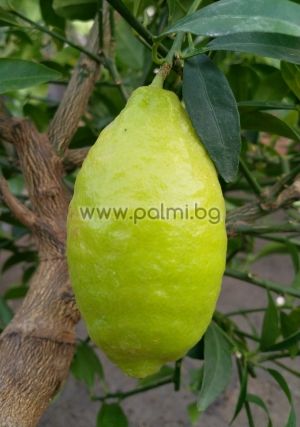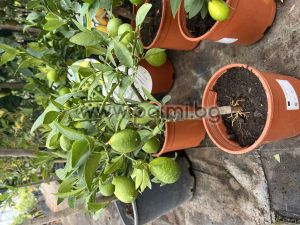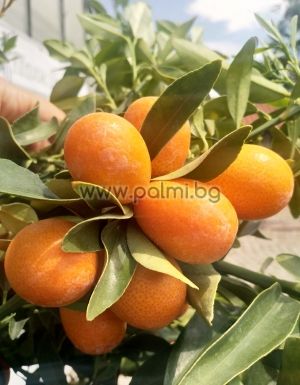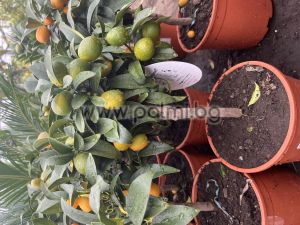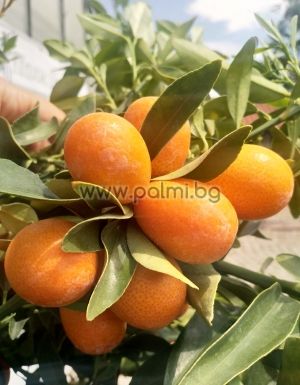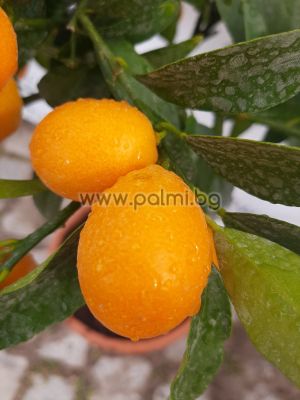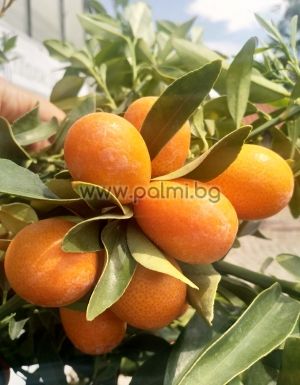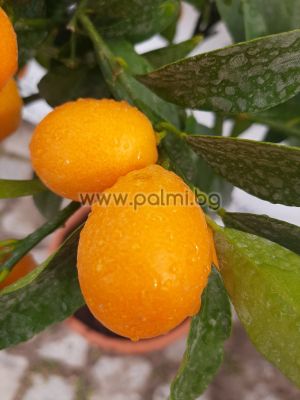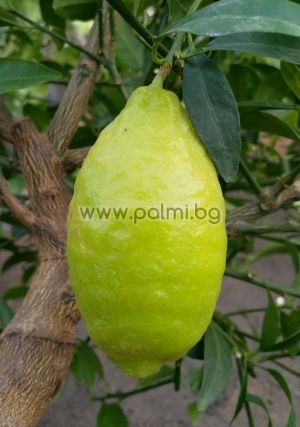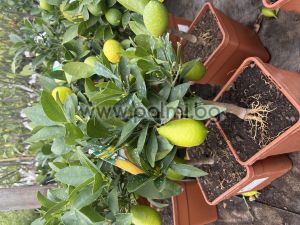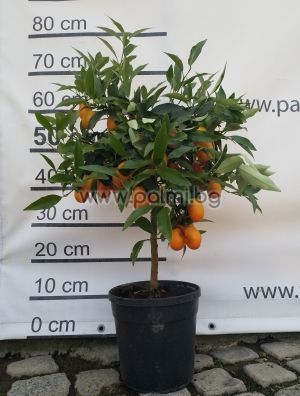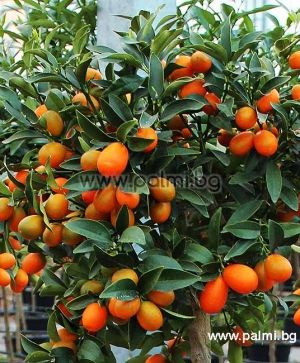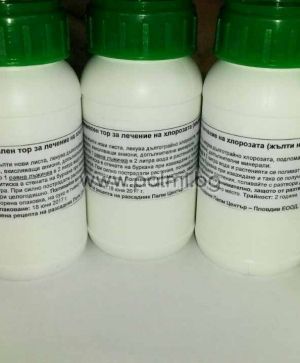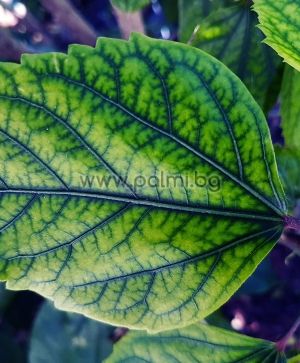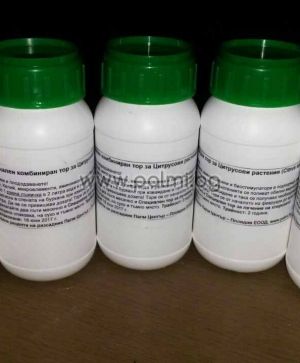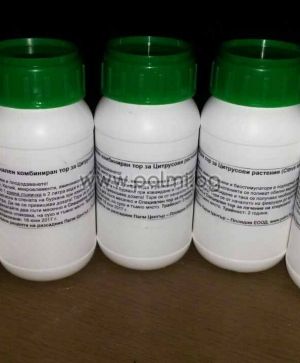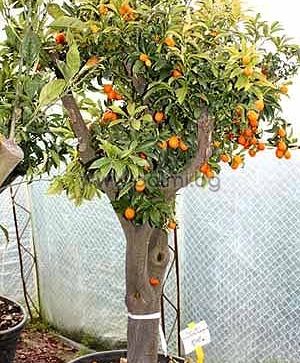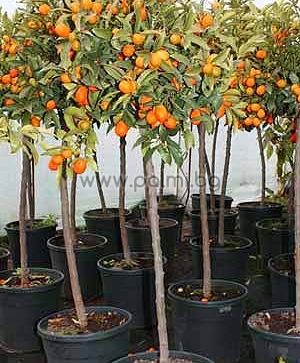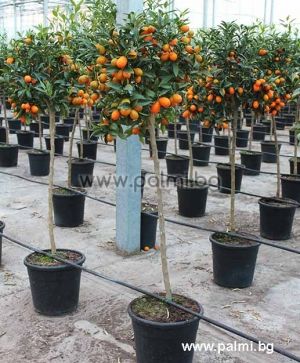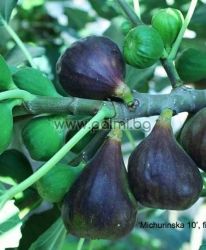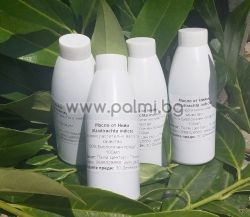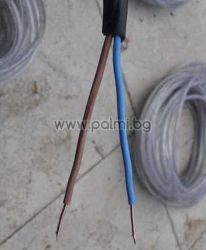Kumquat and hybrid varieties
Kumquat and hybrid varieties. We have a good assortment of varieties - Kumquat, Limequat, Mandarinquat.
Limequat
Limequat
Citrus x Limequat
This unusual citrus is a cross between a Lime and a Kumquat. This citrus will impress you with its beautiful fruits that are edible.
Its cultivation follows the principle of all other citrus trees, requiring abundant watering at least once a day in the summer, and twice a day on the hottest days.
In autumn, it is brought inside in a dry and cool place, with temperatures in the range of 1-15 degrees. In the spring, after it warms up and there are no nighttime sub-zero temperatures, it can be taken outside to start the formation of flowers and fruits. Flowering begins in February-March, and the ripening of the fruits is up to 6m.
Availability: 13 pcs
Nagami Kumquat
Nagami Kumquat
Fortunella margarita
Pot φ 17 cm
Graft 10-15 cm
Important notice! Most citrus plants on the market are produced for planting in orchards in the Mediterranean countries. They have a large overall height, have high graft and are difficult to shape and support at home. Rootstocks on which they are grafted are very fast growing, which is fine for the open ground in the subtropics, but is not desirable when growing in pot in the temperate climate.
All our small citrus plants are produced specifically for the Bulgarian market and are ideally suited for home cultivation. The rootstocks cause compact growth, grafts are low and this allows making an excellent shape of the crown, to be suitable for growing in pots. The used rootstocks are trifoliate orange (Poncirus trifoliata 'Flying Dragon') and Volkamer lemon, Citrus volkameriana. Trifoliate orange is frost-hardy to -25°C, and significantly increases the cold resistance of plants grafted on it.
More than any other Citrus, Kumquat is of high ornamental value. The fruits are tasty and are consumed with the peel. They can hang on the tree for several months ripening, so most people usually prefer to keep them as ornamental. As with all other Citrus plants, Kumquat is susceptible to scales and spider mites and needs to be sprayed twice a year.
In winter it will need a cool place with temperatures 0-10 degrees Celsius. If the temperature is higher, the leaves usually fall off. In summer it needs to be outside and abundantly watered.
Much more information about Kumquat and all other citrus species is available on our forum:
Availability: 25 pcs
Nagami Kumquat
Nagami Kumquat
Fortunella margarita
Important notice! Most citrus plants on the market are produced for planting in orchards in the Mediterranean countries. They have a large overall height, have high graft and are difficult to shape and support at home. Rootstocks on which they are grafted are very fast growing, which is fine for the open ground in the subtropics, but is not desirable when growing in pot in the temperate climate.
All our small citrus plants are produced specifically for the Bulgarian market and are ideally suited for home cultivation. The rootstocks cause compact growth, grafts are low and this allows making an excellent shape of the crown, to be suitable for growing in pots. The used rootstocks are trifoliate orange (Poncirus trifoliata 'Flying Dragon') and Volkamer lemon, Citrus volkameriana. Trifoliate orange is frost-hardy to -25°C, and significantly increases the cold resistance of plants grafted on it.
More than any other Citrus, Kumquat is of high ornamental value. The fruits are tasty and are consumed with the peel. They can hang on the tree for several months ripening, so most people usually prefer to keep them as ornamental. As with all other Citrus plants, Kumquat is susceptible to scales and spider mites and needs to be sprayed twice a year.
In winter it will need a cool place with temperatures 0-10 degrees Celsius. If the temperature is higher, the leaves usually fall off. In summer it needs to be outside and abundantly watered.
Much more information about Kumquat and all other citrus species is available on our forum:
Availability: 24 pcs
Nagami Kumquat
Nagami Kumquat
Fortunella margarita
Important notice! Most citrus plants on the market are produced for planting in orchards in the Mediterranean countries. They have a large overall height, have high graft and are difficult to shape and support at home. Rootstocks on which they are grafted are very fast growing, which is fine for the open ground in the subtropics, but is not desirable when growing in pot in the temperate climate.
All our small citrus plants are produced specifically for the Bulgarian market and are ideally suited for home cultivation. The rootstocks cause compact growth, grafts are low and this allows making an excellent shape of the crown, to be suitable for growing in pots. The used rootstocks are trifoliate orange (Poncirus trifoliata 'Flying Dragon') and Volkamer lemon, Citrus volkameriana. Trifoliate orange is frost-hardy to -25°C, and significantly increases the cold resistance of plants grafted on it.
More than any other Citrus, Kumquat is of high ornamental value. The fruits are tasty and are consumed with the peel. They can hang on the tree for several months ripening, so most people usually prefer to keep them as ornamental. As with all other Citrus plants, Kumquat is susceptible to scales and spider mites and needs to be sprayed twice a year.
In winter it will need a cool place with temperatures 0-10 degrees Celsius. If the temperature is higher, the leaves usually fall off. In summer it needs to be outside and abundantly watered.
Much more information about Kumquat and all other citrus species is available on our forum:
Availability: 58 pcs
Limequat
Limequat
Citrus x Limequat
Pot 14x14
Draft 10-15 cm
This unusual citrus is a cross between a Lime and a Kumquat. This citrus will impress you with its beautiful fruits that are edible.
Its cultivation follows the principle of all other citrus trees, requiring abundant watering at least once a day in the summer, and twice a day on the hottest days.
In autumn, it is brought inside in a dry and cool place, with temperatures in the range of 1-15 degrees. In the spring, after it warms up and there are no nighttime sub-zero temperatures, it can be taken outside to start the formation of flowers and fruits. Flowering begins in February-March, and the ripening of the fruits is up to 6m.
Availability: 39 pcs
Nagami Kumquat
Fortunella margarita, Nagami Kumquat is one of the most valuable citrus varieties
More than any other Citrus, Kumquat is of high ornamental value. The fruits are tasty and are consumed with the peel. They can hang on the tree for several months ripening, so most people usually prefer to keep them as ornamental. As with all other Citrus plants, Kumquat is susceptible to scales and spider mites and needs to be sprayed twice a year.
In winter it will need a cool place with temperatures 0-10 degrees Celsius. If the temperature is higher, the leaves usually fall off. In summer it needs to be outside and abundantly watered.
More information about Kumquat and other citrus species is available on our forum:
Availability: 17 pcs
200 g fertilizer for treatment of chlorosis
Fertilizer concentrate for chlorosis treatment
Special blend, prevents the appearance of yellow new leaves, treats long-lasting chlorosis, supports quality growth
Ingredients: Iron salts, magnesium salts, acidifying ions, additional minerals.
Application: Dissolve 1 tablespoon in 1 gallon of tap water and water the plants abundantly every 2 to 4 weeks. In case of severely damaged plants, apply the fertilizer every 2 weeks until green and quality new growth is developped! Could be applied all year round to potted plants. Use with caution to avoid rust spots on any surrounding surfaces! Please note, that this fertilizer will affect mostly the new growth, not the old leaves that are already damaged. Do not overdose!
Storage: In a tightly closed package, in a dry and dark place. Durability: 2 years.
Net: 7 oz (200 gr)
Own recipe of the nursery Palm Center-Plovdiv Ltd., Bulgaria, www.palmi.bg
Availability: 8 pcs
Nagami Kumquat
Fortunella margarita, Nagami Kumquat is one of the most valuable citrus varieties
More than any other Citrus, Kumquat is of high ornamental value. The fruits are tasty and are consumed with the peel. They can hang on the tree for several months ripening, so most people usually prefer to keep them as ornamental. As with all other Citrus plants, Kumquat is susceptible to scales and spider mites and needs to be sprayed twice a year.
In winter it will need a cool place with temperatures 0-10 degrees Celsius. If the temperature is higher, the leaves usually fall off. In summer it needs to be outside and abundantly watered.
This size is the biggest Kumquat in our nursery. We do not ship it COD (cash on delivery), only with advanced payment!
More information about Kumquat and other citrus species is available on our forum:
Availability: 1 pcs
Nagami Kumquat
Fortunella margarita, Nagami Kumquat is one of the most valuable citrus varieties
More than any other Citrus, Kumquat is of high ornamental value. The fruits are tasty and are consumed with the peel. They can hang on the tree for several months ripening, so most people usually prefer to keep them as ornamental. As with all other Citrus plants, Kumquat is susceptible to scales and spider mites and needs to be sprayed twice a year.
In winter it will need a cool place with temperatures 0-10 degrees Celsius. If the temperature is higher, the leaves usually fall off. In summer it needs to be outside and abundantly watered.
More information about Kumquat and other citrus species is available on our forum:
Availability: 11 pcs

